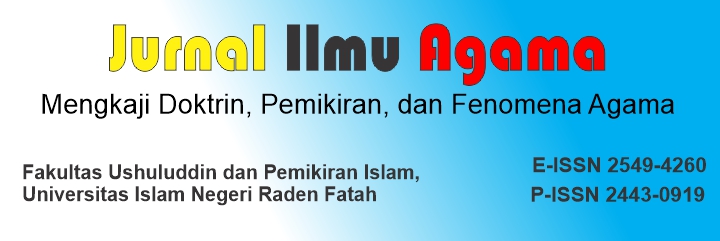The Concept of I'jāz Rasm of the Qur'an According to M. Syamlūl on the Words Hasanāt and Sayyiāt in the Qur'an
Main Article Content
Abstract
The writing of the Qur’an is different from Arabic writing in general even though the pronunciation is the same. The scholars of fiqh, Qur’anic scholars, and theologians agree that the writing of the Qur’an which is different from the writing of Arabic in general is intended to enable the Qur'an to contain al-ahrūf al-sab'ah. It also shows the truth about the existence of miracles in the Qur'an. This miracle became known as i'jāz rasm. The majority of scholars are of the opinion that the writing of the Qur’an is an order of the Prophet Muhammad (tauqīfī), and no one has the right to change it. However, it is still rare for people to discuss the miracle of the Qur’an in terms of writing (rasm). One of the scholars who discussed the i'jāz rasm is M. Syamlūl in his work entitled I'jāz Rasm al-Qur’an wa I'jāz al-Tilāwah. Departing from the above problems, the author tries to examine how the concept of i'jāz rasm according to Syamlūl's view, especially on the words hasanāt and sayyiāt in the Qur’an. The method used in this research is library research with qualitative research. The purpose of this study is to examine the concepts given by Syamlūl about the differences in writing in the Qur’anic rasm. The results of this study reveal that the i'jāz rasm in the Qur'an that focuses on the words hasanāt and sayyiāt is not only related to the differences in writing that may violate Arabic writing in general which shows the uniqueness of the Qur’an alone, but also to the depth of moral messages and implied meanings conveyed through the differences in the writing of the words hasanāt and sayyiāt.
Article Details

This work is licensed under a Creative Commons Attribution 4.0 International License.
Authors who publish with this journal agree to the following terms:
- Authors retain copyright and grant the journal right of first publication with the work simultaneously licensed under a Creative Commons Attribution 4.0 International License that allows others to share the work with an acknowledgement of the work's authorship and initial publication in this journal.
- Authors are able to enter into separate, additional contractual arrangements for the non-exclusive distribution of the journal's published version of the work (e.g., post it to an institutional repository or publish it in a book), with an acknowledgement of its initial publication in this journal.
- Authors are permitted and encouraged to post their work online (e.g., in institutional repositories or on their website) prior to and during the submission process, as it can lead to productive exchanges, as well as earlier and greater citation of published work.
How to Cite
References
Al-Quran al-Karim.
Almas, Ummy, et al. “Perbedaan Penulisan Rasm: Telaah I’jaz Rasm Al-Qur’an Perspektif M. Syamlul.” Jurnal At-Tahfidz 4, no. 2 (2023): 130-145.
Denffer, Ahmad Von. Ilmu Al-Qur’an Pengenalan Dasar. Jakarta: Rajawali Press1988, 1988.
Gufron, Mohammad, and Rahmawati. Ulumul Qur’an Praktis Dan Mudah. Yogyakarta: Penerbit Teras, 2013.
al-Hamad, Ghanim Qadduri. Rasm Al-Mushaf : Dirasah Lughawiyyah Tarikhiyyah. Baghdad: al-Lajnah al-Wathaniyah bi Mathla’ al-Qarn al-Khamis Asyr al-Hijriy. 1982.
Ismail, Sya’ban. Rasm Al-Mushaf Wa Dhabthihi Baina at-Tauqif Wa Al-Isthilahat Al-Haditsah. Cairo: Dar al Salam. n.d.
Jubaedah, Siti. “Konsep I’jaz al-Tilawah dan Implikasinya terhadap Pemaknaan Al-Qur’an (Telaah Atas Kitab I’jaz Rasm Al-Qur’an wa I’jaz al-Tilawah Karya Muhammad Syamlul).” Tesis S2., UIN Sunan Kalijaga, 2023.
Mandzur, Ibnu. Lisan al-Arab. Juz. 12. Beirut: Dar Sader. 1990.
Masyhur, Kahar. Pokok-Pokok Ulumul Qur’an. Cetakan Pe. Jakarta: PT RINEKA CIPTA, 1992.
Muhammad, Ahsin Sakho. Membumikan Ulumul Qur’an: Tanya Jawab Memudahkan Tentang Ilmu Qiraat, Ilmu Rasm Usmani, Ilmu Tafsir, Dan Relevansinya Dengan Muslim Indonesia. Edited by Qamaruddin SF. Cetakan 1. Jakarta: Penerbit Qaf, 2019.
Mukhtar, Naqiyah. Ulumul Qur’an. Edited by Abdul Wachid. Purwokerto: Penerbit STAIN Press, Purwokerto, 2013.
al-Qattan, Manna Khalil. Studi Ilmu-Ilmu Qur’an. Edited by Mudzakir. Diterjemah. Bogor: Lentera Antar Nusa, 2019.
Shihab, M.Quraish. Mukjizat Al-Qur’an. Edited by Gus Ballon and Sa’di. Cetakan 1. Bandung: Penerbit Mizan, 1977.
Suma, Muhammad Amin. Ulumul Qur’an. Jakarta: PT RajaGrafindo Persada, 2013.
al-Suyuthi, ’Abd ar-Rahman Jalal al-Din. Al-Itqan Fi ’Ulum Al-Qur’an. Juz 5. Beirut-Lebanon: Resalah Publishers, 2008.
Syamlul, Muhammad. I’jaz Rasm Al-Qur’an Wa I’jaz at-Tilawah. Kairo: Dar el-Salam, 2006.
Zakaria, Muhammad Abi al-Husain Ahmad Ibn Faris Ibn. Mu’jam Maqayis al-Lughah. Beirut: Dar al-Fikr. 1979.
al-Zarqani, Muhammad ‘Abd al-‘Azim. Manahil al-‘Irfan fi Ulum al-Qur’an. Beirut: Dar al-Kitab al-‘Arabiyyah. 1995.
